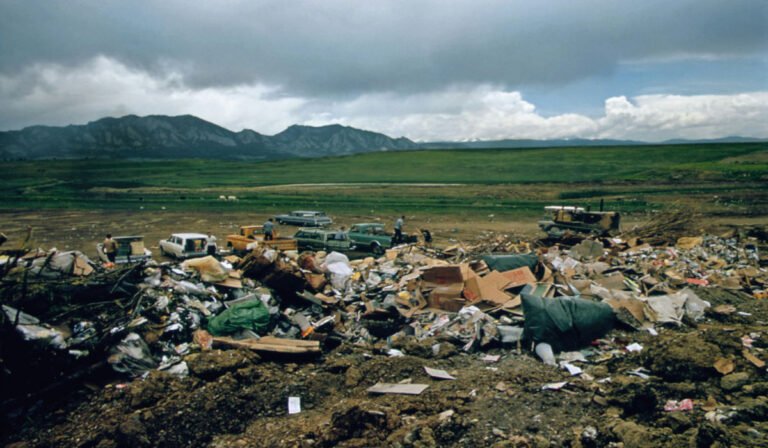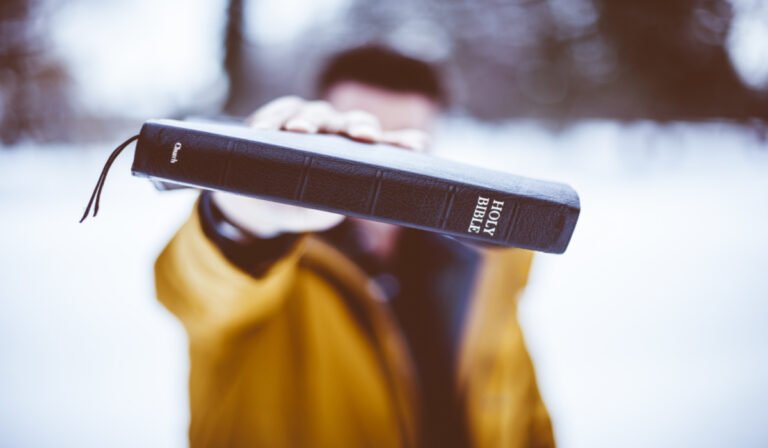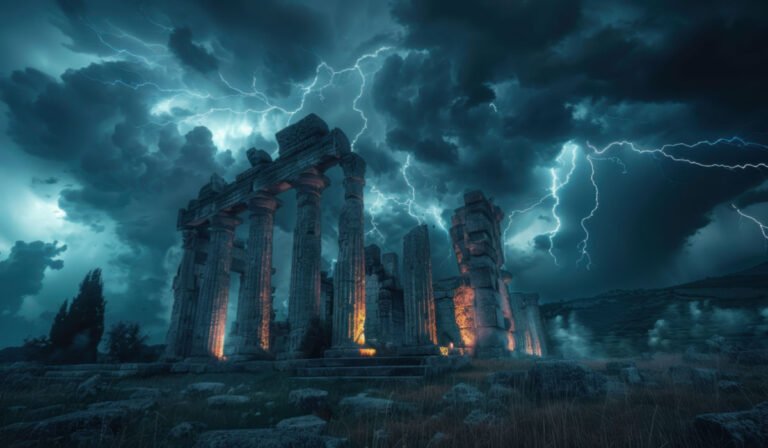time is running out
The world in Noah’s day was harsh and unforgiving. People’s actions grew darker as violence, immorality and greed became the norm. These were not passing problems but warnings of a divided and troubled society, far from what God wanted for people.
Faced with such extremes, God chose to bring a global flood as a response. “So God said to Noah: ‘The end of all flesh has come before me, because the earth is full of violence as a result of them; and here I am bringing them to ruin together with the earth.’” (Genesis 6:13) Even then, Noah showed real trust in God and lived differently, holding onto faith when most chose corruption.
We see in this account a lesson about standing out for what is right, even when it seems no one else cares.
The Spread of Violence and Immorality Before the Flood
As we explore life before the Flood, we see a sharp decline in the way people acted towards each other. The world moved further from respect, kindness and decency. Not only did violence and immorality become common, but greed and corruption also ruled daily life. What we find from the history in Genesis is more than an old story. It’s a clear warning against letting standards slip.
People’s Behaviour Becomes Worse
Actions in society were spiralling downwards. Families fell apart as people chased their own wants above all else. Even simple decency faded as harmful attitudes spread like a disease. The scriptures paint a clear picture:
“Jehovah saw that man’s wickedness was great on the earth and that every inclination of the thoughts of his heart was only bad all the time.” (Genesis 6:5)
This shows us just how bad things became. There was no balance—wrongdoing crowded out anything good. It was not just an occasional outburst or mistake but a constant, growing problem. People treated each other with cruelty, putting their own gain ahead of honesty and loyalty at every turn.
Greed and Corruption Take Over
Greed soaked into the way people lived and did business. It wasn’t just about wanting more but grabbing it, no matter who got hurt. Fairness faded as the strongest and richest pushed the weakest aside. Many saw nothing wrong with stealing, lying or cheating to get what they wanted.
- Bribery and dishonesty crept into every relationship.
- Justice and kindness meant almost nothing to most.
- The gap between the powerful and the powerless grew larger each year.
This type of world was not what God had wanted for people. Trust broke down, and friendship became rare. Neighbours saw each other as competition, not as people to support or trust.
God’s View of Humankind
God watched as the situation went from bad to worse. He saw the loss of goodness and the rise of greed and violence. The scripture records:
“So God saw the earth and, look! it was ruined, because all flesh had ruined its way on the earth.” (Genesis 6:12)
This was not just disappointment. It was a deep sadness at what people had become. God did not ignore or excuse what was happening. The choice to bring the Flood was a response to a world that had left behind the values of respect, fairness and kindness. He noticed the difference in Noah, whose actions stood out as faithful in a sea of corruption.
Looking at these ancient days, we can see what happens when morals slip. The Flood story is more than history—it’s a clear example of how quickly a society can fall when people ignore what is right.
God’s Decision to Reset the Earth
At this point in history, the story turns from sadness to a clear act of change. The world in Noah’s day had reached a breaking point. People’s hearts had grown cold, and their actions hurt each other every day. The world was nothing like what God first planned. Looking at the details, we see a serious choice by God to clear away what was broken and protect what was still good.
God’s Original Purpose for People
When God first made people, He set out a purpose filled with hope. People were meant to live in peace and care for the earth. The garden where He placed the first people, Adam and Eve, was a place of beauty, growth and safety. God wanted families to grow, enjoy honest work and fill the earth with kindness. The goal was simplicity—living close to nature and close to God, surrounded by love and respect.
However, over time, people lost sight of these aims. Peace turned into conflict, trust broke down and the first purpose faded. What God saw in Noah’s day was the complete opposite of His plan. The world had traded goodness for selfish gain and peace for violence.
A Clear Warning of Coming Destruction
God did not act suddenly or without reason. He watched as harm spread and gave people clear warnings. God spoke to Noah, telling him that destruction would soon come—the earth would be covered with a flood.
“So God said to Noah: ‘The end of all flesh has come before me, because the earth is full of violence as a result of them; and here I am bringing them to ruin together with the earth.’” (Genesis 6:13)
Even as Noah began building the ark, he became a visible sign of what was coming. He warned those around him each day as he worked. Despite the clear warning, most people showed no interest. Many mocked him, refusing to believe that life as they knew it could ever change.
Noah’s steady work on the ark was like a loud alarm that most ignored. They laughed, carrying on with their lives, forgetting that their actions brought harm. God’s patience had a limit, and in time, the warning became reality.
Preserving What Was Good
God valued what was honest and faithful. He saw Noah’s actions and chose to save him and his family. While the rest of the world turned away, Noah stayed strong in his trust. God told Noah to build the ark, making a safe place for what was worth saving. In addition to Noah’s family, God brought animals into the ark—
- Two of every kind of unclean animal—male and female.
- Seven pairs of every kind of clean animal.
- Birds of every sort to keep their kinds alive on the earth.
This careful plan showed that God still cared about life and wanted something good to survive. Noah’s trust and hard work became the way God protected the future.
Looking at this moment, we see a strong lesson—trust and goodness matter, even if most choose another path. God’s reset was not just an end but a chance to begin again, holding on to the hope He first gave people.
Noah—A Righteous Man in a Dark World
Amid a corrupt world overflowing with violence and greed, one person’s life stood out. Noah’s actions and choices spoke louder than any words, showing that decency and faith were possible even during the worst of times. While most people ignored the warnings and kept on as before, Noah listened to God, choosing a path that was different and courageous.
Noah’s Outstanding Qualities
Noah’s life set him apart. He was not swept along by what everyone else did or thought. “Noah was a righteous man. He proved himself faultless among his contemporaries. Noah walked with the true God.” (Genesis 6:9)
We see several qualities in Noah that stayed constant, even when those around him lost their way:
- Loyalty to God—while most forgot about God’s standards, Noah still held them high.
- Honesty in conduct—Noah lived uprightly, without slipping into the dishonesty that had become so common.
- Patience and perseverance—his work on the ark lasted many decades, yet he never gave up.
- Respect for others and creation—he treated life as something precious, in sharp contrast with the world’s cruelty.
Noah’s actions were clear and steady. He chose faith over fear, action over apathy.
Why Noah Found Favour with God
Among all the chaos, Noah’s values drew God’s attention. While the Bible says “all flesh had ruined its way,” it also notes: “But Noah found favour in the eyes of Jehovah.” (Genesis 6:8)
God looked for hearts that were honest and faithful, not just outward acts. Noah’s trust was not passive. His belief shaped every part of his life:
- He listened to God’s direction, even when it sounded impossible.
- He acted on the warning by building the ark, not just for himself but for his whole family.
- His trust showed through lifelong obedience—not in grand gestures, but in steady, daily choices.
Noah’s example shows what God values: real trust, steady action and respect for what is right, even when few do the same.
Trusting in God Despite Ridicule
Building an ark in the middle of dry land took more than skill and hard work. It needed solid faith. As Noah worked, people around him mocked and laughed. They refused to believe a flood could happen. Their words and actions tested Noah’s confidence every day.
Yet, Noah kept going. He trusted God’s word over popular opinion. While people pointed fingers, Noah used his hands to keep working. His resolve was not loud, but it was strong as steel. He did not let mockery derail his trust.
Noah’s willingness to act differently serves as a reminder. It takes courage to do what is right when most go the other way. The story encourages us today: standing firm in faith and values matters, no matter who laughs or doubts.
Building the Ark—Obedience and Ridicule
The command to build the ark did not come in an easy time. With darkness spreading through the world, God asked Noah to do what sounded impossible. Yet as this project took shape, every board and nail became a statement of trust. The work did not happen in secret. Neighbours, friends and strangers all watched, voicing doubt in the face of a warning they refused to believe. This is a moment in history when one family’s obedience shone against loud mockery and a flood of scepticism.
Instructions for Building the Ark
God gave clear and precise instructions for building the ark. Unlike anything seen before, this was not just a large boat but a carefully designed refuge. The details were more than advice—they were commands from God, laid out for true protection and survival.
“Make for yourself an ark out of wood of a resinous tree. You will make compartments in the ark, and you will cover it with tar inside and outside. This is how you will make it: The ark should be 300 cubits long, 50 cubits wide, and 30 cubits high.” (Genesis 6:14-15)
The plan included:
- The type of wood to use—resinous, able to last through rain and flood.
- Exact measurements, which made the ark stable and strong.
- Multiple compartments for people and animals.
- A roof and a single door on the side.
Every part had a reason. Nothing was random. God’s instructions went deep into detail so that Noah and his family could survive all that was coming. This care highlighted how much God valued not just the outcome but the process. Trusting these instructions was as important as using the right materials.
The People’s Reaction—Mocking and Doubt
As Noah and his sons worked, passersby became spectators, then critics. People found the whole idea impossible. Rain and floods large enough to cover the earth had never happened before. The warnings seemed foolish to nearly everyone.
They laughed at the thought of a worldwide flood. Their daily lives went on as usual. Seeing Noah covered in sawdust and tar, they did not see faith—they saw what they felt was nonsense. The ark became a joke in their eyes, not a warning.
- Some called him mad for believing disaster was near.
- Others whispered that he had wasted his time and resources.
- People pointed and laughed, building little trust in what God had said.
Their doubt grew with each new day, even as the ark took shape before their eyes. This behaviour showed just how far their hearts were from listening or learning.
Noah’s Steadfast Work
Despite mockery, Noah continued his work with steady hands and a calm focus. He was not moved by noise or laughter, holding firmly to God’s command. Building the ark required more than manual skill—it called for emotional strength every day.
- He followed God’s plan without cutting corners or changing the design.
- He worked with family, sharing tasks and effort.
- Each day, he proved his belief by action, not just words.
This work took many years. Yet Noah did not slow down or give up, even though no one else helped outside his family. He did not cower in shame or argue with every critic. Instead, his faith stood quiet yet strong.
His perseverance sets a standard—real trust holds firm even when no one else believes. By keeping on, Noah became an example of taking God at His word when reasons to doubt surrounded him. Every plank hammered into place was an act of quiet courage.
The Flood Arrives—Deliverance and Judgement
This moment in Noah’s account brings together every warning, every act of trust and every moment of ridicule. Actions are about to speak louder than words, as God’s judgement falls and deliverance arrives for those who trusted Him. The events that follow are not just about water and survival—they show what it means when right and wrong finally take their course.
Entering the Ark—Securing Safety
When the time arrived, God called Noah and his family into the ark. This was a clear turning point. Noah, his wife, his sons, and their wives all entered as commanded. Animals of every kind entered as well, following in pairs or sevens, exactly as God instructed.
The act of closing the door stands out:
“After that Jehovah shut the door behind him.” (Genesis 7:16)
This was not simply a practical step. When God shut the door, it marked a line between safety and danger, trust and denial. Those inside the ark rested in a shelter designed by God, not by chance or skill alone. Outside, the world continued as if nothing would change.
Securing safety did not come from luck or from being stronger or smarter. It came from listening, believing and acting in step with what God said. The separation was final and fair, based on faith not excuses.
The Flood Unleashed—A Turning Point
When the rain began, it was relentless. This was no summer storm but the start of something that would cover mountains and sweep away cities. The scripture records the scale:
“The floodgates of the heavens were opened.” (Genesis 7:11)
Rain poured down for forty days and nights, matching the seriousness of what had been warned. Springs of water burst from the earth, meeting the torrents from the skies. The waters rose quickly, lifting the ark and sweeping away the lives built on what people wanted, not what God wanted.
Every familiar place vanished underwater. Fields, markets and homes disappeared. What people trusted—wealth, strength, crowds—made no difference in the flood. Only the ark floated, carried above judgement by the hands that built it in faith.
This was the turning point. Debates, jeers and doubts had no voice once the rain started. Everything outside the ark ended, not as punishment without reason, but as the end of a chapter filled with warnings. What happened outside was not random disaster, but the fair result of ignored warnings.
After the Waters Recede—A Fresh Start
The flood did not last forever. God remembered Noah and those with him. The waters began to go down, slowly and steadily. A wind passed over the earth, helping the ground dry. It took months for mountaintops to appear and even longer before it was safe to leave the ark.
Noah, his family, and the animals walked onto dry ground. The world was quiet and empty. Every step was a step into something new—a restart built on survival and trust instead of violence and greed.
Noah’s first act was one of thanks:
“Then Noah built an altar to Jehovah and took some of all the clean animals and of all the clean birds and offered burnt offerings on the altar.” (Genesis 8:20)
This was not just a ritual. It was a way to set the new beginning on the right path, recognising God’s role in every moment of survival. The earth itself was given a new chance, free from the cycle of harm that came before.
From this point, life started again. Families, animals and the whole world received a clean slate. The story moves from grief and loss to careful hope, showing that an ending can become a beginning if we keep faith and hold to what matters most.
Conclusion
We see in this account that real trust in God stands out, even when society rejects it. Noah’s steady faith and obedience brought safety while others kept to their own ways. His example invites us to reflect on our choices today—will we act with trust, keep to what is right and hold onto faith in the face of doubt or mockery?
The story of Noah urges us to build strong values and seek honesty even when it feels difficult. As we face modern pressures, these lessons remind us that listening to God and standing firm can lead to hope and a new beginning. Thank you for taking the time to share this journey with us. .






